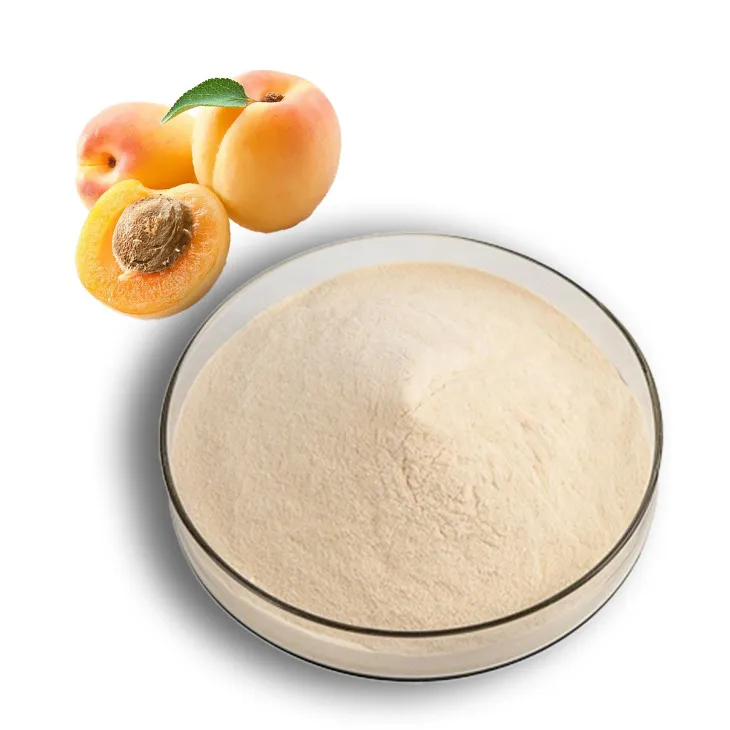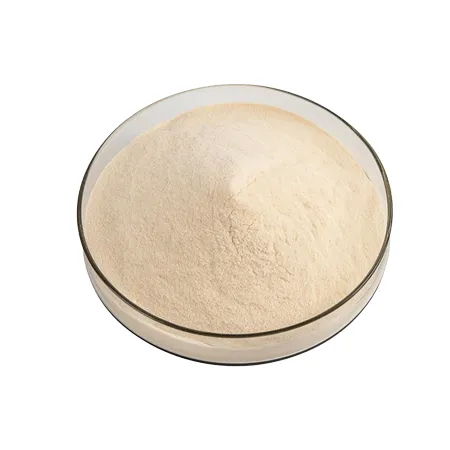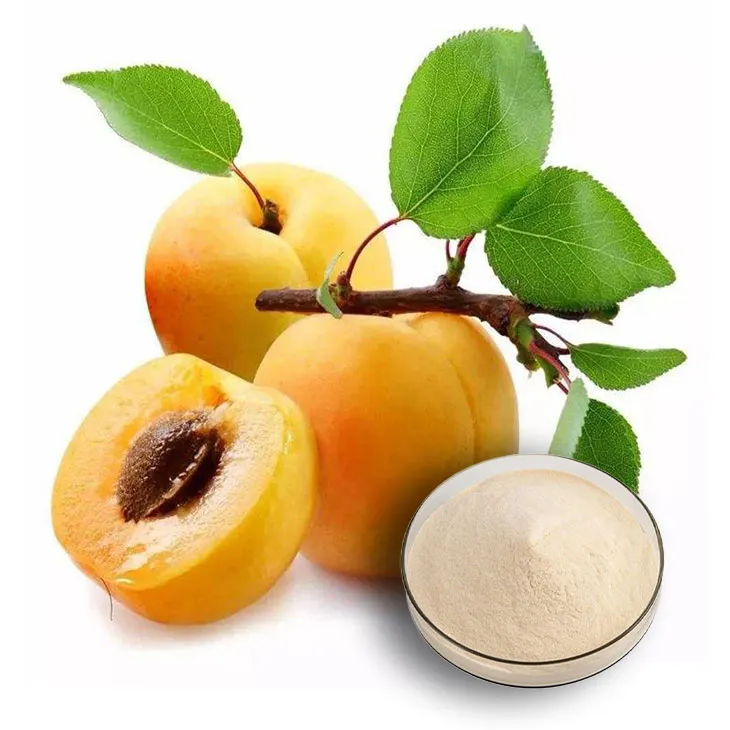- 0086-571-85302990
- sales@greenskybio.com
Benefits of apricot powder in cattle feed.
2024-11-11

1. Introduction
In the realm of cattle farming, the quality of feed plays a crucial role in determining the overall health, productivity, and quality of the livestock. One such ingredient that has been gaining attention in recent years is Apricot Powder. Apricot Powder offers a range of benefits when incorporated into cattle feed, which can have a significant impact on various aspects of cattle rearing.

2. Nutritional Composition of Apricot Powder
2.1 Vitamins
- Apricot powder is a rich source of vitamins, particularly vitamin A. Vitamin A is essential for maintaining good vision in cattle. It also plays a vital role in the proper functioning of the epithelial tissues, which line the various organs and cavities in the body of the cattle. This helps in protecting the animals from various infections.
- It also contains vitamin C, an antioxidant vitamin. Vitamin C helps in the synthesis of collagen, which is important for the integrity of connective tissues in cattle. This can be beneficial for the overall structural health of the animals, including their joints and muscles.
- One of the important minerals present in apricot powder is potassium. Potassium is necessary for maintaining proper nerve function and muscle contraction in cattle. Adequate potassium levels help in preventing muscle cramps and ensure smooth movement of the animals.
- Apricot powder also contains magnesium. Magnesium is involved in many enzymatic reactions in the body of cattle. It is important for the metabolism of carbohydrates, proteins, and fats. Additionally, it helps in maintaining the normal structure of bones and teeth in the animals.
The presence of antioxidants in apricot powder is another significant aspect. Antioxidants such as flavonoids help in neutralizing free radicals in the body of cattle. Free radicals are unstable molecules that can cause damage to cells and tissues, leading to various health problems. By reducing the oxidative stress caused by free radicals, the antioxidants in apricot powder contribute to the overall well - being of the cattle.

3. Health Benefits for Cattle
3.1 Boosting the Immune System
- The vitamins and antioxidants present in apricot powder work together to boost the immune system of cattle. Vitamin A, for example, helps in the development and function of immune cells. Antioxidants protect these immune cells from oxidative damage, allowing them to function effectively in fighting off pathogens such as bacteria, viruses, and parasites.
- A strong immune system means that the cattle are less likely to fall ill, which in turn reduces the need for antibiotics and other medications. This is not only beneficial for the health of the animals but also for the quality of the meat and milk produced, as it reduces the risk of antibiotic residues.
- Apricot powder contains dietary fiber, which can have a positive impact on the digestive system of cattle. Fiber helps in adding bulk to the diet, which promotes proper bowel movements. It also provides a substrate for the growth of beneficial gut bacteria.
- The minerals in apricot powder, such as magnesium, are involved in the enzymatic reactions related to digestion. They help in breaking down food components, ensuring that the cattle can absorb the nutrients more efficiently from their feed.

4. Impact on Meat and Milk Quality
4.1 Meat Quality
- The nutrients from apricot powder can enhance the marbling of meat in cattle. Marbling refers to the intramuscular fat deposits, which are desirable as they contribute to the tenderness, juiciness, and flavor of the meat. For example, the proper balance of vitamins and minerals can influence the fat deposition in the muscles during the growth of the cattle.
- Antioxidants in apricot powder can also improve the shelf - life of the meat. By reducing oxidative processes, they prevent rancidity and maintain the freshness of the meat for a longer period.
- When it comes to milk production, the vitamins and minerals in apricot powder can be transferred to the milk. For instance, vitamin A is important for the nutritional quality of milk. A diet rich in apricot powder can potentially increase the vitamin A content in the milk, making it more nutritious for human consumption.
- The improved health of the cattle due to apricot powder in their feed can also lead to a more consistent milk production. Cows that are in better health are less likely to experience fluctuations in milk yield, and the quality of the milk in terms of fat and protein content may also be more stable.
5. Considerations in Using Apricot Powder in Cattle Feed
5.1 Dosage
- Determining the appropriate dosage of apricot powder in cattle feed is crucial. Too little may not provide the desired benefits, while too much could potentially cause imbalances in the diet or other adverse effects. The dosage should be based on factors such as the age, weight, and physiological state of the cattle.
- For example, younger calves may require a lower dosage compared to adult cattle. It is recommended to consult with a veterinarian or an animal nutritionist to establish the correct dosage for different categories of cattle.
- The quality of apricot powder used in cattle feed should be carefully monitored. This includes ensuring that the powder is free from contaminants such as pesticides, heavy metals, and mycotoxins. Contaminated apricot powder can pose a serious health risk to the cattle.
- Regular testing of the apricot powder should be carried out to verify its nutritional composition and purity. This helps in maintaining the consistency of the benefits provided to the cattle.
6. Conclusion
In conclusion, apricot powder offers a variety of benefits when included in cattle feed. It enriches the feed with essential vitamins, minerals, and antioxidants, which in turn enhance the health of the cattle. By boosting the immune system and aiding digestion, it contributes to the overall well - being of the animals. Moreover, it has the potential to improve the quality of both meat and milk. However, proper considerations regarding dosage and quality control are necessary to ensure that these benefits are maximized and potential risks are minimized. With the right approach, apricot powder can be a valuable addition to cattle feed in modern livestock farming.
FAQ:
What are the main nutrients in apricot powder?
Apricot powder contains vitamins such as vitamin A, vitamin C, and some B - vitamins. It also has minerals like potassium, magnesium, and iron. Additionally, it provides antioxidants like flavonoids.
How does apricot powder boost the immune system of cattle?
The vitamins and antioxidants in apricot powder play a crucial role. For example, vitamin C can enhance the function of immune cells, and antioxidants help to reduce oxidative stress, which in turn supports the overall immune response of cattle.
Can apricot powder really improve the quality of cattle meat?
Yes, it has the potential to do so. The nutrients in apricot powder can contribute to better muscle development and fat deposition in cattle. This may lead to more tender and nutritious meat.
How does apricot powder aid in cattle digestion?
It contains certain fibers and nutrients that can stimulate the growth of beneficial gut bacteria. These bacteria help in the breakdown of feed and the absorption of nutrients, thus improving the digestion process in cattle.
What is the appropriate amount of apricot powder to add to cattle feed?
The appropriate amount depends on various factors such as the age, weight, and health status of the cattle. Generally, it should be added in moderation, usually starting from a small percentage (around 1 - 2%) of the total feed and adjusted based on the response of the cattle.
Related literature
- The Role of Functional Feed Additives in Cattle Nutrition"
- "Nutritional Benefits of Fruit - Based Additives in Livestock Feed"
- "Apricot - Derived Nutrients and Their Impact on Animal Health"
- ▶ Hesperidin
- ▶ Citrus Bioflavonoids
- ▶ Plant Extract
- ▶ lycopene
- ▶ Diosmin
- ▶ Grape seed extract
- ▶ Sea buckthorn Juice Powder
- ▶ Fruit Juice Powder
- ▶ Hops Extract
- ▶ Artichoke Extract
- ▶ Mushroom extract
- ▶ Astaxanthin
- ▶ Green Tea Extract
- ▶ Curcumin
- ▶ Horse Chestnut Extract
- ▶ Other Product
- ▶ Boswellia Serrata Extract
- ▶ Resveratrol
- ▶ Marigold Extract
- ▶ Grape Leaf Extract
- ▶ New Product
- ▶ Aminolevulinic acid
- ▶ Cranberry Extract
- ▶ Red Yeast Rice
- ▶ Red Wine Extract
-
Golden Seal Extract
2024-11-11
-
Camu Camu Extract
2024-11-11
-
Hedyotis Diffusa Extract
2024-11-11
-
Avocado Extract Powder
2024-11-11
-
Propolis Extract Powder
2024-11-11
-
Beetroot juice Powder
2024-11-11
-
Coix Seed Extract
2024-11-11
-
Mango flavored powder
2024-11-11
-
Bilberry Extract
2024-11-11
-
Polygonum multiflorum extract
2024-11-11





















